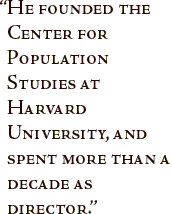

| Revelle influenced public opinion on the carbon dioxide issue through a widely read
article published in Scientific American in August 1982. His research
addressed issues such as the rise in global sea level and the relative
role played by the melting of glaciers and ice sheets versus the thermal
expansion of the warming surface waters. Revelle's international
scientific contacts did a great deal to disseminate research findings
and to foster discussion about the data, environmental and social
effects of increased atmospheric carbon dioxide, and governmental policy
and action. Revelle considered this work very important, once estimating
that he spent twenty percent of his time keeping current with the issue.
In 1963, Revelle took a leave of absence from Scripps and formally switched fields from oceanography to public policy. He founded the Center for Population Studies at Harvard University, and spent more than a decade as director. His primary interests were applications of science and technology to world hunger. In 1976, Revelle returned to the University of California-San Diego where he received the title of Professor of Science and Public Policy and joined the Department of Political Science.
Revelle served on scores of academic, scientific, and government committees advising on a wide spectrum of topics. He was science adviser to the Secretary of the Interior, president of the American Association for the Advancement of Science, and a member of the NASA Advisory Council. In November 1990, Roger Revelle received the National Medal of Science from President George Bush. He remarked to a reporter: "I got it for being the grandfather of the greenhouse effect." next: Links and References
|
 On the Shoulders of Giants
| ||